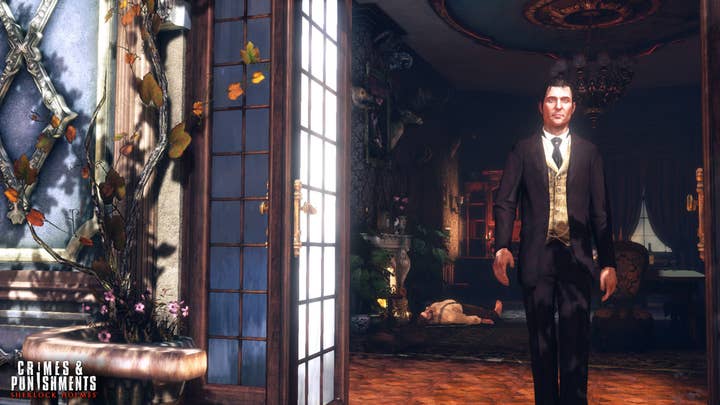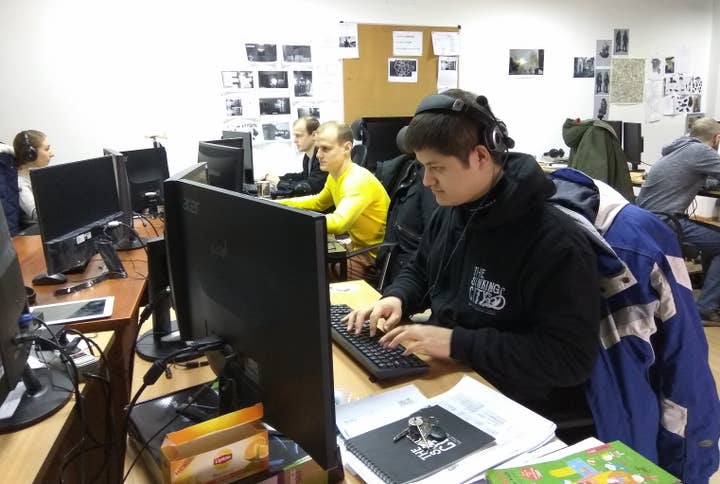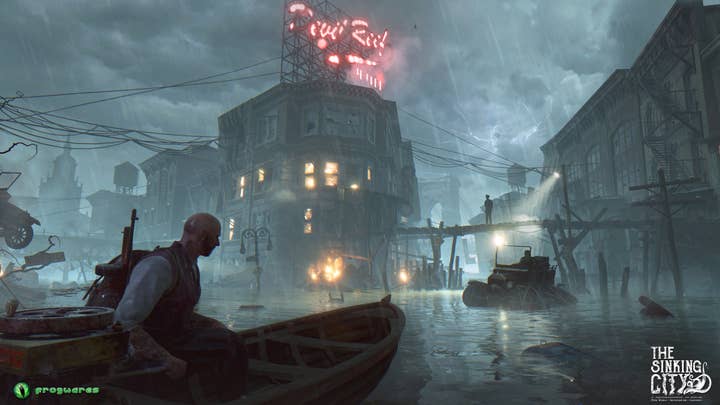The secret success of the Sherlock Holmes video games
The TV and movie franchises may take all the headlines, but Frogware's Sherlock Holmes series has now shifted over 7m units and it's growing
For 40 years Sherlock Holmes was a phenomenon that dominated the literary scene.
Arthur Conan Doyle's 60 Holmes stories (56 short stories and four novels), published between 1887 to 1927, would spawn a seemingly countless number of TV series, movies, comics, books, plays and radio dramas. Doyle was alive to see Holmes immortalised on screen several times, although even he would probably be surprised to see his iconic detective continue to rule the entertainment landscape 90 years on via different movie and TV franchises.
The success of the likes of Sherlock and Elementary may dominate the Holmes legacy today, but the famous cocaine-taking sleuth has also made a strong transition to the interactive world.
Over the last 15 years, Ukrainian games studio Frogwares has produced eight Sherlock Holmes titles that have together sold 7m copies globally.

"We started very modestly with an adventure game. It was the definition of an indie game of that time," remembers Waël Amr, president and CEO of Frogwares.
"We needed little technical expertise or money to complete that project and the main idea was to learn from it."
He continues: "Our start was a really bumpy road - it was at the time of the first crisis in the video game industry. The real adventure was actually to make the game and sign with a publisher that wasn't dead by the time of the release. The first three publishers died, the fourth was the right one.
"After we released our first game it was getting easier for us. We learned a lot about many aspect of game creation, design, graphics, localisation, narration, etc... and some of tricks of the industry, like reading between the lines of publishing contracts.
"The real adventure was actually to make the game and sign with a publisher that wasn't dead by the time of the release"
"To this day, we remained independent and never worked for hire. Our games always financed themselves - it was a solution that lead to slow but constant improvement, game after game. We picked that strategy as we witnessed a lot of good studios being forced to die prematurely when the relation with their publisher was being too unbalanced. Looking back at all those years, it was one heck of an adventure."
Frogwares was an established Holmes veteran before Guy Ritchie's movies and the BBC TV series came along, propelling the Sherlock Holmes brand back into the limelight 80 years on from its final story.
"[Those TV shows and films] had a very positive impact," recalls Amr. "It renewed interest in the licence worldwide and gave it a quality value. It attracted publishers once again, as they saw our games as a potential successful brand."
As well as gradually increasing in sales, the Sherlock games have been getting better. 2014's Sherlock Holmes: Crime and Punishment was particularly notable for its visual leap, and even attracted some 'game of the year' attention from enthusiasts. "We proved to ourselves that we also have some skill as developers," Amr says.
He continues: "We knew that there was a demand for investigation style games on the market, and having the Sherlock Holmes brand attached to it certainly gave our games a bit more 'oomph' power. However, when we released Sherlock Holmes: Crimes and Punishments not that long ago, we were blown away by the critical acclaim the game received from the press, which led people that aren't in the so called 'target market' to look at our titles and writing to us how much they enjoyed playing our games.
"It was great to see that games cannot be defined just by market segmentations - a great game can touch many different people in many different ways. It's as if the game becomes a piece of art and not just a product."

Amr says the success of Holmes - both commercially and critically - has changed the appetite of the studio as it looked to work on new IP.
"We became more and more hungry," he says. "Not just for success, but with our own plans, dreams, and ambitions. The financial success gave us a bit of freedom and allowed us to make bigger and bigger games - in production, scope, world building, etcetera.
"The success of the last Sherlock Holmes games also bought in new fans of our studio, and in all honesty, it is one of the best feelings I get. As a CEO, it is so nice to hear praise from gamers playing your games. Don't get me wrong, we also receive negative feedback, but having people talk to us, and to have that two-way communication with them is truly a wonderful experience. It's the closest I'll ever get to feeling like a rockstar - our fans really mean the world to me and the whole of the Frogwares team.
"This is the closest I'll ever get to feeling like a rockstar - our fans really mean the world to me and the whole of the Frogwares team"
"I guess what I'm trying to say is that success gave us a kick to keep going, and doing what we want to do. It made us believe in ourselves and believe in what we are doing is right."
Alongside the success of Holmes, Frogwares has found itself boosted by a vibrant development scene in Ukraine - which also includes the likes of Ubisoft Kiev, 4A Games and GSC Game World. Amr says there's a big art scene in the country, while schools put a focus on IT and programming, which the nation's studios are benefiting from. The general low cost of production is also an element that has given Ukraine's developers an advantage over other markets.

Now Frogwares is heading in a more ambitious direction. Following last year's Sherlock Holmes: The Devil's Daughter, the firm's next game is a new IP called The Sinking City. It's an open-world mystery game, which sees the studio attempt to create its own universe and develop an 'open story'.
"One day, our producer Yuriy Shevaga and Sergey Gulenko showed me and the team a little prototype for a game that they've been working on for the last two weeks," Amr recounts. "They've been very secretive about it, always going on little meetings, and acting suspicious. So after the two weeks of working behind closed doors, they called me in, and showed me what they've been working on.
"The prototype was of a simple idea - the concept of a free investigation. They wanted to show how you can conduct an investigation in a non-linear environment. There was no tasks or GPS markers telling you what your next goal is - you had to figure it out all by yourself. When I and a few others played it, a little seed got planted in our minds. There was something in this concept that was fresh and new. There was something different about it.
"Now the first thought was to use this gameplay mechanic for a new Sherlock Holmes game - a knee-jerk reaction you might say. But we were thinking more and more about it, and we realised that we can take this mechanic and place it in a more fitting and complementary environment, one in which the world can mess with your mind. And that's how the idea of The Sinking City came about."

The title is set in Lovecraft's universe and is based around the Cthulhu Mythos. It's not the first time that Frogwares has used this as a basis for its title; Sherlock Holmes: The Awakened in 2006 was a Lovecraftian game, as was 2013's Magrunner.
"Lovecraft and the Cthulhu Mythos have influenced all fantastic and horror creation for a century now, whether books or movies," says Amr. "Games are no exception. The first horror survival game was Alone in the Dark and we are children of this culture. Working with investigation and narration, Lovecraft is a natural pick, and our aspiration to make better and bigger games resonate very strongly with this."
"We are open to working with a publisher, but it has to be the right one. We want this to be a beautiful relationship/love story and not a marriage made from necessity"
Frogwares was also working on another Lovecraftian game in the form of Call of Cthulhu for Focus Home Interactive, yet that title has since been handed to French studio Cyanide.
"I guess sometimes, like in real life, relationships fall apart due to differences," Amr says. "We are not at liberty to talk about this specific case, however. We wish Focus all the best, and we have our fingers crossed for them with Call of Cthulhu."
He says The Sinking City is not connected to that title. "It's an original game that saw its genesis after the release of Crimes and Punishments in 2014, when we asked ourselves what we want to do next, the answer came rather naturally."
Alongside Focus, Frogwares has worked with an eclectic line-up of publishers, including the likes of Big Ben, Atlus, Ubisoft, Activision, Bandai Namco and a number of smaller companies, too. The Sinking City is currently without a big name backer, and when you factor in the studio's growing popularity and balance sheet, is there even a need for Frogwares to work with publishers going forward?
"Well, a great publisher can offer you and your studio opportunities that you by your own might not be able to accomplish," Amr concludes. "For example, having physical copies of your game distributed and placed on store shelves is something that we know a publisher can do a better job with than us.
"So we are open to working with a publisher, but it has to be the right one. We want this to be a beautiful relationship/love story and not a marriage made from necessity."
